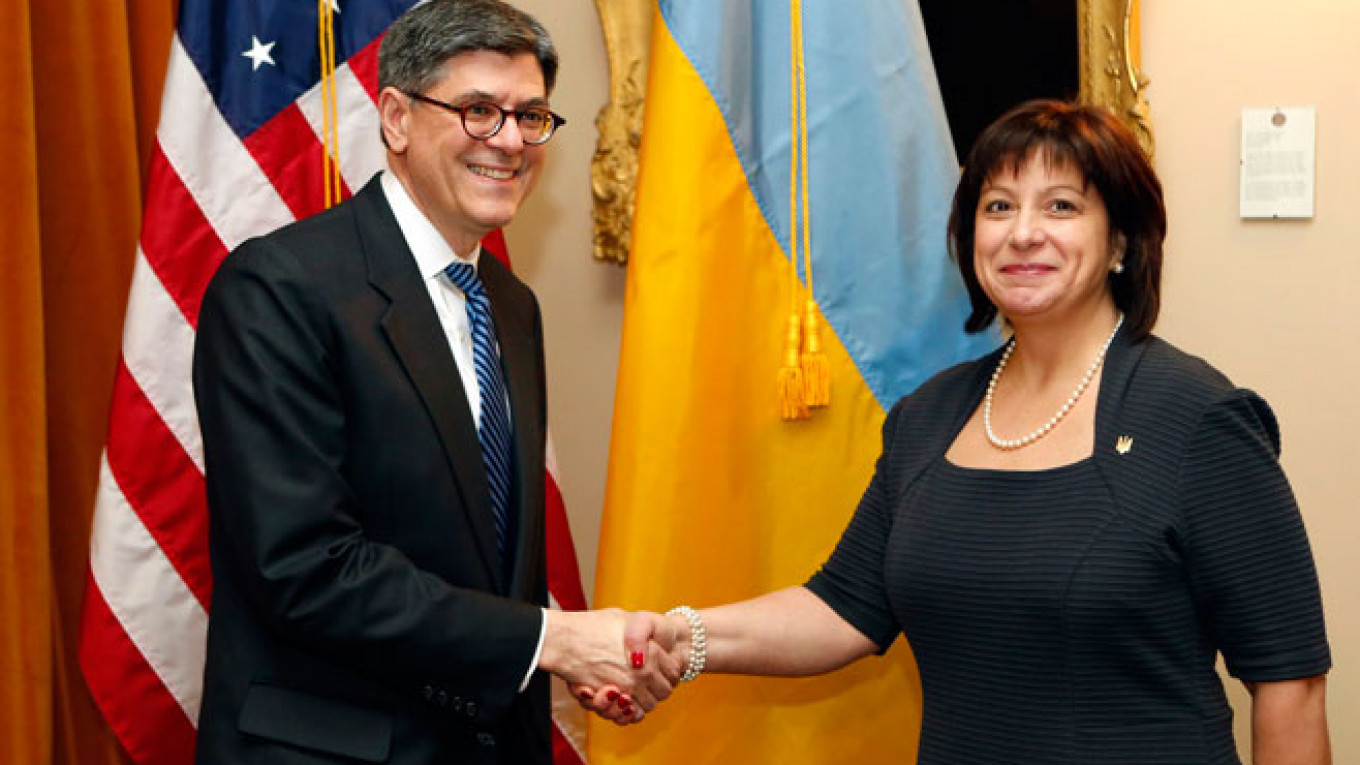The well-known military theorist Carl von Clausewitz once said that "War is a mere continuation of politics by other means." Now, to paraphrase Clausewitz, while the Minsk II cease-fire continues to hold in eastern Ukraine, Russia looks set to use its financial leverage over Ukraine as a "continuation of war by other means."
As part of its effort to stabilize its economy, Ukraine recently agreed on a $17.5 billion bailout program with the International Monetary Fund. This aid from the IMF is part of a planned $40 billion rescue package for Kiev that will include further contributions of about $7 to $8 billion from the European Union and the United States.
The remaining $15 billion hole in Kiev's finances is supposed to be filled with savings to come from restructuring Ukraine's debt through negotiations with its foreign bond holders. Unfortunately for Kiev though, while sovereign debt restructurings are fairly common, this is where Russia comes into the picture.
In December 2013, amid the ongoing Euromaidan demonstrations, Moscow promised then-Ukrainian President Viktor Yanukovych's government $15 billion to support Ukraine's economy. While government-to-government loans are common, Russia's initial disbursement to Ukraine was actually in the form of a two-year, $3 billion eurobond purchased by one of the Kremlin's sovereign wealth funds.
Now, as Ukraine begins talks with its foreign lenders, the status of Russia's $3 billion Ukrainian eurobond threatens to throw a wrench in new Finance Minister Natalie Jaresko's efforts to restructure its foreign debt — and perhaps scupper its $40 billion aid package altogether.
When Russia purchased Ukraine's $3 billion eurobond, Moscow inserted a "poison pill" clause in the instrument's fine print which mandated that if the Ukrainian government's total debt to gross domestic product rose above 60 percent, Russia could immediately call in the loan.
As Ukraine's economy sank last year, its total debt load soared above 60 percent, providing President Vladimir Putin a financial "sword of Damocles" it has continued to hold over the head of President Petro Poroshenko's government.
Although Russia has so far refrained from calling in its Ukrainian eurobond, the Kremlin is pressuring Kiev in a different way by declaring that the bond should be classified as bilateral debt.
If the bond is considered to be bilateral debt, then any restructuring is guided by the Paris Club, an informal group of countries — including Russia — that was set up to handle the restructuring of government-to-government debt. In this case, Russia's bond is not subject to any private restructuring deal Jaresko might strike with Ukraine's remaining private-sector bond holders.
Ukraine, not surprisingly, is claiming that Russia's bond is not bilateral, and that it should be classified as falling under the London Club, a forum for restructuring sovereign debt held by private sector lenders.
In this scenario, Russia will not get any special treatment in the restructuring talks Jaresko engages in with Ukraine's private bond holders.
Pointing out that no eurobond has ever been classified as Paris Club debt, Jaresko recently snapped that "they are a eurobond but they are saying they are not London Club. I am not going to do the work for them."
While determining which "club" an international bond belongs in may seem like an esoteric issue for lawyers to hash out, in this case it is critical. If Russia's bond is taken off the restructuring table, it opens up a $3 billion hole in Ukraine's financial projections.
"This $15 billion in potential savings from restructuring its debt is critical for Ukraine," said Tim Ash, head of emerging market research at Standard Bank. "When the IMF loans money it needs to be sure it can be paid back, and if Ukraine cannot wring out this $15 billion in savings the IMF will feel very nervous about going forward with this loan," explained Ash.
Even worse for Ukraine, the IMF is not permitted to lend to one state that is in default to another. The IMF stated firmly in 2013 that "private external arrears are tolerated but arrears to official bilateral lenders are not."
In practical terms, this so-called "lending in arrears" policy means that if Ukraine is deemed to be in default to Russia, the IMF's entire $17.5 billion loan to Kiev could be threatened. With barely enough hard currency to cover a few weeks' imports, Ukraine's economy would completely collapse.
While this all sounds like a disaster in the making for Kiev, there are still a number of ways events could play out. Indeed, while all eyes are now on the IMF, even the fund itself can't seem to decide if Moscow is holding bilateral or private debt.
While IMF spokesman William Murray initially supported Russia's position, a fund spokesman subsequently stated that "no determination has been made by the fund as to the status of this claim."
One thing that may work in Kiev's favor is that the Ukrainian eurobonds are actually owned by Russia's National Reserve Fund (NRF), which by its own policy guidelines is only allowed to invest into investment grade securities — a status that the Ukrainian bonds certainly do not possess.
According to Anna Gelpern, a law professor at Georgetown University, "there is further ambiguity when a sovereign wealth fund is involved, and when it lends in contravention of its own guidelines."
In the end, says Gelpern, "my bet is that the 'lending in arrears' issue will not be a block on the IMF's loan, but also that a Paris Club restructuring is not necessarily in the cards either."
Another thing that may help Ukraine is that while the bond is bilateral in substance — in the sense that both the debtor and bond holder are government entities — the debt itself is private in form.
Ash added that "the fact that it is a eurobond — a market instrument — makes the picture a bit blurry, and might allow the IMF to justify some juggling of the rules to allow the loan to go through."
Ultimately, however events play out, two points are clear.
First, with an economy in free fall and a country in the middle of a war, Ukraine does not — to say the least — appear to be a great credit risk for the IMF.
Therefore, even assuming that the IMF does allow Ukraine's $17.5 billion loan to go through, this will be a heavily politicized decision, strongly influenced by the West's desire to support Kiev.
Second, with total hard currency holdings of nearly $400 billion, Russia easily could — if Putin wanted to — help resolve Ukraine's funding crisis without suffering undue amounts of financial pain.
However, until there is some kind of political settlement between Moscow and Kiev that protects what the Kremlin sees as Russia's existential national security interests vis-a-vis Ukraine, Putin is unlikely to provide Ukraine the breathing space it needs to get back on its feet.
Josh Cohen is a former USAID project officer involved in managing economic reform projects in the former Soviet Union. He contributes to a number of foreign policy-focused media outlets and tweets at @jkc_in_dc
A Message from The Moscow Times:
Dear readers,
We are facing unprecedented challenges. Russia's Prosecutor General's Office has designated The Moscow Times as an "undesirable" organization, criminalizing our work and putting our staff at risk of prosecution. This follows our earlier unjust labeling as a "foreign agent."
These actions are direct attempts to silence independent journalism in Russia. The authorities claim our work "discredits the decisions of the Russian leadership." We see things differently: we strive to provide accurate, unbiased reporting on Russia.
We, the journalists of The Moscow Times, refuse to be silenced. But to continue our work, we need your help.
Your support, no matter how small, makes a world of difference. If you can, please support us monthly starting from just $2. It's quick to set up, and every contribution makes a significant impact.
By supporting The Moscow Times, you're defending open, independent journalism in the face of repression. Thank you for standing with us.
Remind me later.







